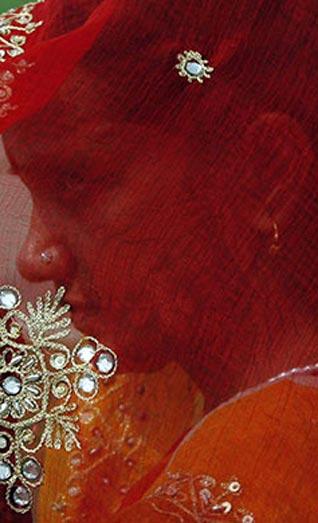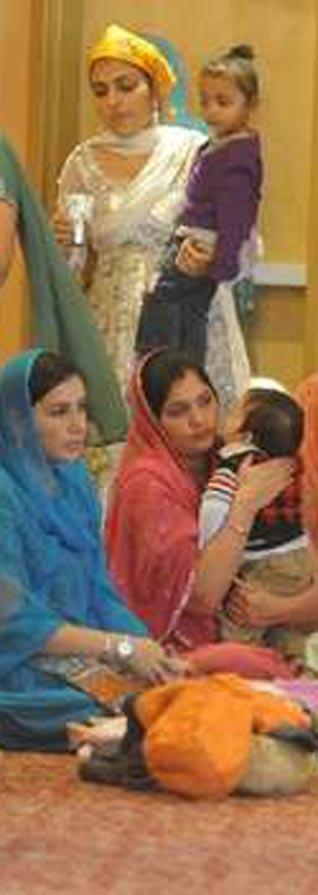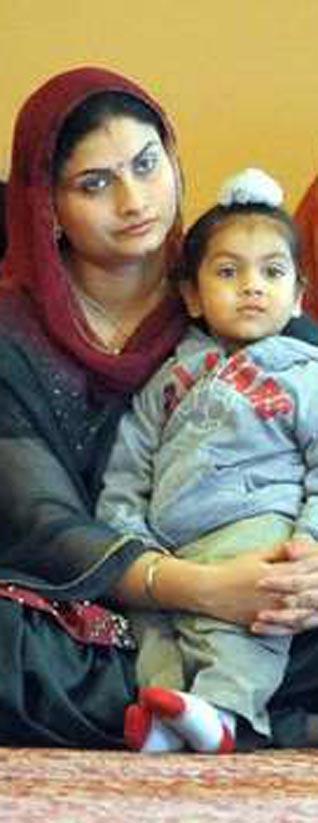Columnists
Cultural Myopia?
The Roundtable Open Forum # 59
by I.J. SINGH
The Roundtable Open Forum #59
We never tire of holding ourselves out as followers of a most progressive religious faith ... and it is.
On matters that define us in this modern but complex society, we know that Sikhi speaks of all humankind as springing from the same flesh and spirit. For us equal rights don't emerge as a newly discovered imperative; they came with the founders of the faith over half a millennium ago.
We know that other religions, big or small, may show inequities in the place of women but not our faith. Others may preach or even practice such shortcomings, but not us - that would be contrary to the faith.
Before we burst with pride, I dare to pick up one pin that should prick our bubble, if nothing else will.
I wrap my sermonette today around the lives of two mature and middle-aged Sikh women who have spent much or all of their lives in western societies outside the numbing embrace of Indian and Punjabi culture. Both are personally pleasant and attractive; professionally successful and stable.
One was born a Sikh, the other became one later in life a few years ago. Each was married for some time but has been divorced for over a decade. Both remain dedicated Sikhs.They write about Sikhi with great sensitivity and practice its teachings most assiduously. One has a child. The other has no children.
I never realized how insular our Punjabi Sikh society really is until I met these two women.
Of course, these two would have liked to remarry. And all these years they tried to enter the large Sikh society hoping to meet an eligible Sikh male. But the doors of our Punjabi society remain closed, almost hermetically sealed, to them, except in the most superficial sense. Both of them have been active in the Sikh community for years. They are both successful writers. They have actively participated in Sikh conventions and causes. One has even initiated and led Sikh initiatives. The other has become a recognized writer and commentator on Sikh issues. Yet they remain on the fringes of our society.
They speak of their frustration in finding and meeting eligible Sikh males. I understand that there would necessarily be very few in their age group but surely there would be some. Introductions don't come easy. Gurdwaras are not quite as welcoming to such women as they should be. Are Sikh women in the community afraid that these two might steal their husbands? Or is it because these single women remain outside the ambit of an Indian kitty party and the related social scene.
So finally one married a man who is not a Sikh but where she would be able to remain one and
practice Sikhi, while also enabling her to raise any future children as Sikhs. I would think that should qualify the father to be labeled a sehajdhari.
The other is now beyond the child-bearing stage for many reasons and has gotten into a serious relationship with a non-Sikh. She remains a Sikh who very much hopes to continue her practice of Sikhi successfully without conflict.
I celebrate both.
I also recognize that many more diverse and divided responsibilities will enter their lives. These will make their lives fuller but not any easier.
But I regret that our Punjabi Sikh culture remains suspicious of professionally successful women and particularly so if they have a history of marriage and divorce, even more so if there is a child that comes with the package. I also know that these are not the lessons of Sikhi - not what the Gurus taught.
I have said this and yet I also see that what I have said applies more strongly to Sikhs in the diaspora - those have spent some years in the liberal atmosphere of the west - than to those who are still India-based.
But religious teachings, however noble, arose, exist and thrive in the constraints of culture, language and the context of the times. There is a conflict here.
I lay before you only two examples here but I assure you there are many, many more that we all know about. Rather than burying the issue in numbers I would instead like to present a simple case, simply made. Just look around you to buttress my two cases. I also know of some Sikh widows in similar straits.
I know of examples where, particularly in recent years, non-Indian Western women have married Indian Sikh males. That's an entirely different equation that I am not touching today.
The questions I have are many: Are we Sikhs in the diaspora frozen in time and perhaps 50 years behind, as some allege? Are we wedded to Punjabi Sikh culture as it was years ago when we left India? Is it that we have retained the appearance and not the lessons of Sikhs?
DISCUSSION
I invite readers to share your thoughts on the aforesaid as part of this week's Roundtable Open Forum. Please post your comments below.
ijsingh99@gmail.com
January 28, 2011
Conversation about this article
1: H.S. Vachoa ( U.S.A.), January 28, 2011, 10:20 AM.
The answer to your question lies here. I have come to the conclusion that some of us have never grown up to become part of the free society. Only a free society can embrace the ideals of equality of mankind.
2: Gurpreet Singh (Fresno, Califonia, U.S.A.), January 28, 2011, 10:52 AM.
This was shocking and yet at the same time sad to read this. I guess until we Sikhs change our mentality and perception towards divorced or widowed Sikh women, we will be held accountable for the decline of our community. One of the key things that stood out for me was when it said that one of the Sikh ladies has by now married a non-Sikh man. I guess since we as Sikhs keep alienating our women, they will decide to marry non-Sikhs. I guess it's their personal lives but we are the cause of the decision that these Sikh women were, in a way, cornered to make. Today Sikh women are marrying non-Sikhs for many reasons and one of the most common reasons is that since Sikh women are more educated than the Sikh men, they tend to look for a matching or more educated partner. Non-Sikh men are more open-minded than many in our community on issues such as divorce, widowhood, remarriage, etc. Many of us are still trapped in the idiotic caste-based mentality where some of us look for partners from a particular caste, even though our Gurus were emphatic about equality and spoke against the caste system. Yet unfortunately it has crept back like cancer into some ignorant segments of our community. Some Sikh men are amongst the highest alcoholic drinkers around, even though our rehat maryada condemns intoxicants in any form. One more thing that I feel we as a community need to work on is to encourage and facilitate more Sikh women to become granthis, kirtanis, punj piare, raagis, etc., to allow them to carry out the protocol around Guru Granth Sahib, etc. We need to differentiate between Punjabi/ Indian culture and Sikhism.
3: Sahib (Canada), January 28, 2011, 12:18 PM.
I.J. Singh ji, my answer will depend upon the definition of a Sikh. If a person is a mere 'mathha teko' and 'paatth karo' (without understaning it), langar karo a la Malik Bhago, etc., then I think he is just a so-called Sikh and the way he behaves and reacts to this situation is perfectly normal and OK. But if we are talking about practicing Sikh as per the principals of the Sikh way of life, then the above problem would not be there. Therfore, the problem is not this issue or female infanticide or equality of the races issue, etc., the issue is that we are so called Sikhs and most of us do not read and implement the bani of Guru Granth Sahib. Therefore what do you expect from us who go to gurudwars just for langar, chaudarpana, chuglis, and are guided by pujaris (ignorant granthis). I do not want to be rude, but our Gurus wanted us to connect to Shabad Guru, and we are a community that mostly stays away from reading, leave alone living it. We like listening, and the danger is whatever someone tells us either we accept it or reject it by arguing about it, without reading it.
4: Ravinder Singh Taneja (Westerville, Ohio, U.S.A.), January 28, 2011, 5:25 PM.
I take issue with the framing of the question: it implies that somehow Sikhs in India are ahead of the game, whereas the fact is that these attitudes are just as prevalent there. Moreover, successful single women threaten most men, regardless of religion or geography.
5: H. Singh (U.S.A.), January 28, 2011, 10:07 PM.
Kudos to you for bringing up this vital issue, which points to a deeper systemic problem facing our community as a whole, regardless of geography. I don't often get involved in these round table discussions, however, this is immensely important to me. It's a cause I often champion on deaf ears. To sit back and say that we are just not good enough Sikhs or that we don't know bani well enough is just another way to not address the issue. We cannot ignore that many of our gurbani sharp-shooters and very religious members are most vehemently unable to accept a divorcee within their family. I believe we as a community, like most South-Asian communities, are so over-concerned with the notion of izzat, we cannot at all accept women who have 'fallen' from this supposed grace. To live with these notions in today's world will only put us even more behind the curve. Now, if a woman's Izzat is jeopardized or "ruined", there is no more place for her in our present society. This then leads to shunning divorced women. After all, they are perceived as damaged goods. This is also why the sex ratio in our community, regardless of geography, is horrific. Whether you are in Punjab or Toronto, rich or poor, working class or highly educated, the majority still prefer boys and get ultra-sounds to abort girls. This has been happening for so long and our community is so myopic that they don't even notice that they have already lost their most important asset ... girls-women, who are the mothers who will raise more Sikh children. For those of you who might wonder about why I feel so confident in my ideas, and those who will be quick to refute what I say ... let me just say I do know what both women in the above scenario have faced. I've lived it too. I did not loose my faith over my circumstances, however, I have spent a lot of hours contemplating the root and trying arduously to find sparks of change.
6: I.J. Singh (New York, U.S.A.), January 29, 2011, 6:31 AM.
The comments of readers are well taken and need exploration of the points raised - very pertinent. In response to Ravinder Singh, I didn't just imply that there may be a dichotomy between the Sikhs in India and Sikhs living abroad, I was more direct in castigating the diasporan Sikh community. I also know that building a whole case on two examples is not good strategy or logic because in life exceptions abound. Nevertheless, I have to insist that I have come across more examples of progressive attitudes in my infrequent contacts with India-based Sikhs than in the Sikh community outside India. (And I am talking of issues such as remarriage of divorcees, widows, survivors of 1984, etc.) Not unoften, the attitudes of diaspora Sikhs appear frozen in time. Admittedly, my sample in both cases is limited. In the larger non-Sikh, non-Indian community, I have also come across many exceptions to the rule that the man be better educated or holding the more lucrative position in life. Cultural blinders are not unique to Sikhs and we need to grow with the world while holding fast to the Guru-given constants.
7: Manpreet Singh (New Delhi, India ), January 29, 2011, 4:24 PM.
I think Gurpreet Singh (comment #2) has really hit the nail on the head. He really said what we all have felt.
8: Mohan Singh (Toronto, Ontario, Canada), January 30, 2011, 5:03 PM.
Haumai is the main factor. If you look at matrimonial ads of our community, especially those by potential grooms, you will find reflection of the ego and perhaps an answer to your question. However, our Gurus has given us gurbani that teaches us how to interact in society.
9: Jas Singh (Seattle, U.S.A.), January 31, 2011, 5:18 PM.
Divorce is not a gender issue in Punjabi culture. Even when a man is divorced, he too gets overlooked. Especially if one has a child and the father is raising the child. I speak from my own experience.
10: Johnny (England), February 07, 2011, 6:57 AM.
Until we become as progressive as mainstream Jews in the West are, being modern, respecting individual choices in matters of career and marriage, whilst still maintaining our religious traditions as a minority, we will never move on to the next level. The reactionary bonds that are maintained with backward village mentality need to be broken. Having said that, I see that things are changing in many ways in the U.K. Sikhs generally have a high level of female employment rates in comparison with other minority groups, and near to the national average. For every negative story you see or hear, remember there is at least one in which women are succeeding in our community.





